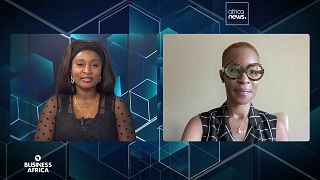Business Africa
Lesotho is looking to double its government revenue despite the impact of the pandemic on the local economy. The country’s revenue authority now has the financial backing to fully implement its tax modernization project. This small southern African nation of 2.1 million people, is banking on improved revenue collection for growth.
Thabo Khasipe, Commissioner General of the Lesotho Revenue Authority tells Business Africa's Ignatius Annor that: ‘’We believe it's quite feasible for us to double our collections by ensuring that we block all the holes to basically reduce leakages, by ensuring that also we modernize in the legislative framework because we also have a rather generous, overly generous legislative framework that is not very well coordinated.’’
S. Africa’s high cost of living
South Africa’s economy was already reeling under pressure. That’s even before restrictions were imposed to curb the coronavirus. And then, a social unrest that affected thousands of businesses in two major provinces. KwaZulu-Natal and Gauteng account for half of the country's GDP. Duma Gqubule, Director of the Centre for Economic Development and Transformation tells our correspondent Karabo Terrence that: “I have seen one number of loss of R50 billion by the property association. I have seen another of R200 billion to the economy by Rand Merchant Bank. So there are widely divergent views on cost to the economy. But I think the cost to the economy goes far beyond the numbers and the jobs that will be lost but affects the confidence in our South Africa economy.’’
Central Africa stock exchange
And a new era is opening up for the Central African financial market, following the merger on July 1, 2019 of the Douala and Libreville stock exchanges. They have just recorded the very first IPO of a company in the financial sector called ''La Régionale''.
‘’We believe that people will now be able to come to the stock exchange to buy La Régionale's shares and if they need money, they can also come and invest their shares and this is our job and responsibility’’, said Charles Rollin Ombang Ekath, Director and General Manager at La Régionale.
This is also the first time that shares of a private company have been listed on the stock exchange. It's an operation that breaks with the gloom observed for two years on this stock exchange.
Louis Paul Motaze is the Cameroonian Minister for Finance. ‘’SMEs have a lot of difficulty getting financing from traditional banks because traditional banks provide what is called short term financing, whereas with the stock market, they can obtain long term financing. So, SMEs could benefit a lot from their participation in the stock exchange’’, Motaze said.
The Central African Stock Exchange is one of the least active in Africa. And financial experts believe that the main challenge is the lack of communication.
‘’The general public must be increasingly taught and educated about the stock market. It will also be necessary to explain to business promoters and company managers, both small and large, the opportunities that the stock market brings them’’, said Heubo Delort, Deputy Managing Director of Financia Capital.
Correspondent Lambert Ngouanfo reports from Douala, the coastal city of Cameroon's southwest that: ‘’There is a slight shift in the dynamism of the Central African financial market. The stock market culture is absent. However, for finance professionals, 80% of companies in the CEMAC zone are SMEs, which are in need of capital and should turn to the Central African stock market to raise funds in order to develop.’’





![Oligui Nguema: A breakthrough or continuity for Gabon? [Business Africa]](https://static.euronews.com/articles/stories/09/18/37/26/320x180_cmsv2_0ddbed7e-31aa-5396-921a-e042c3fc82f0-9183726.jpg)







Go to video
South Africa slashes planned VAT hike after pushback from Democratic Alliance
Go to video
Digital exhibition brings story of ancient Egypt's King Tut to life
Go to video
Why is Spain considering a 100% tax on homes bought by non-EU residents?
Go to video
Tanzania suspends media company's online platforms for 30 Days
02:12
Kenya president backs down on tax rises after deadly protests
Go to video
Death toll rises to 22 a day after Kenyan protesters stormed parliament